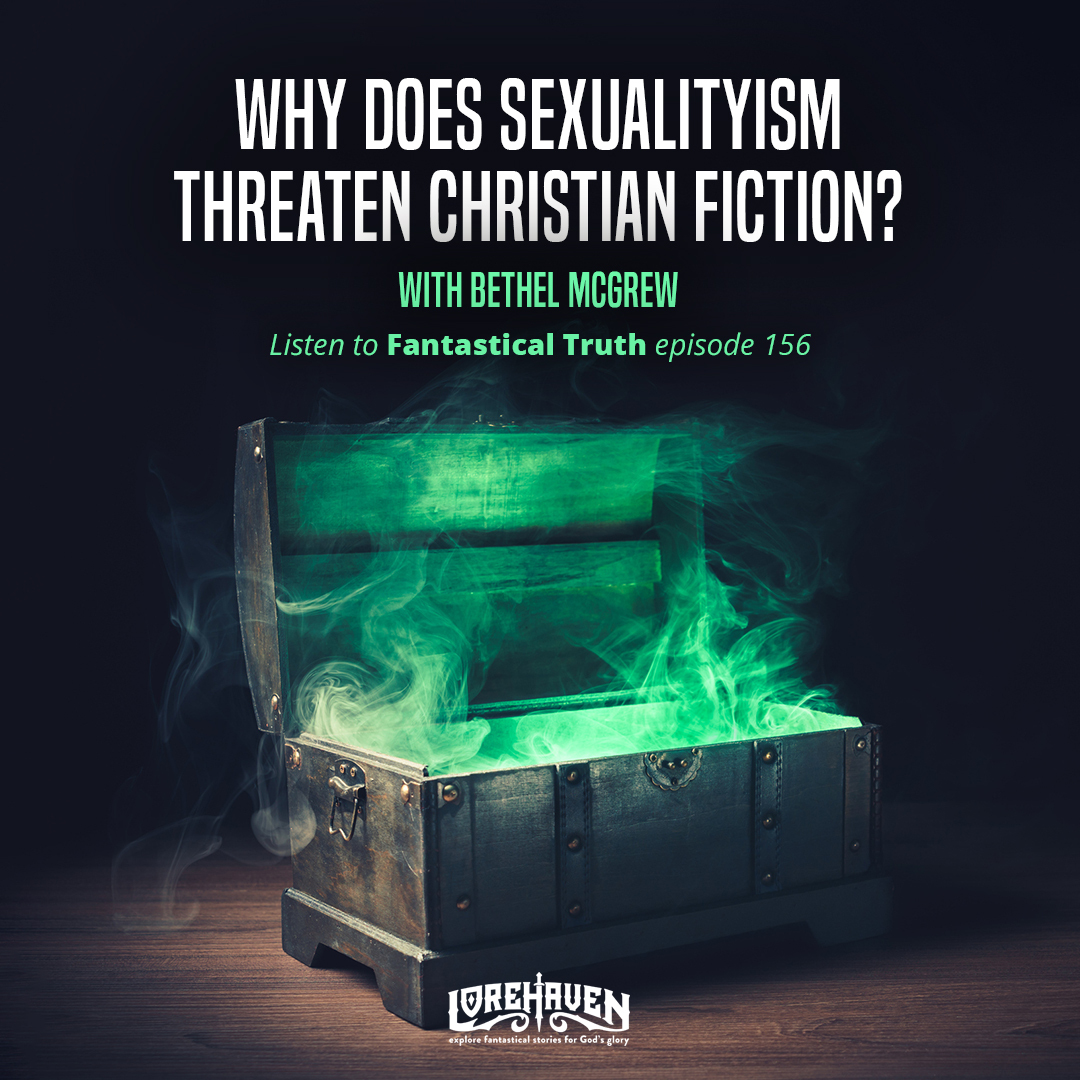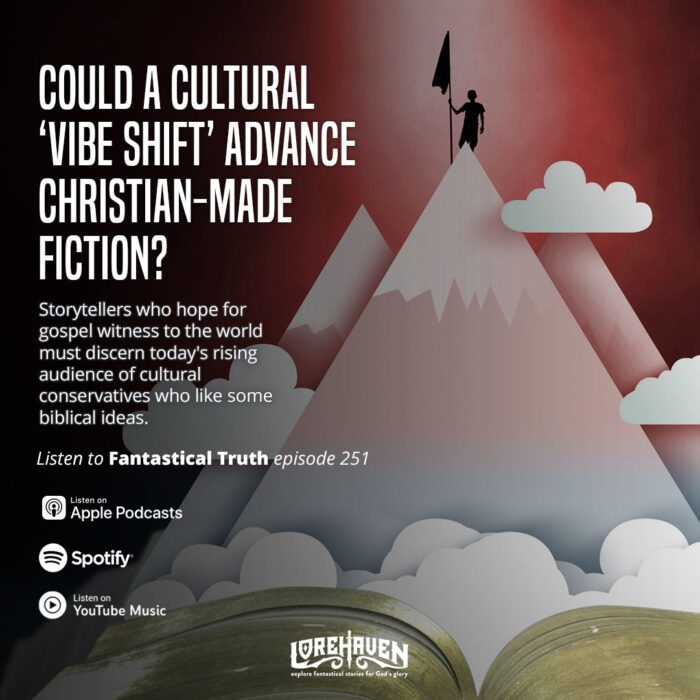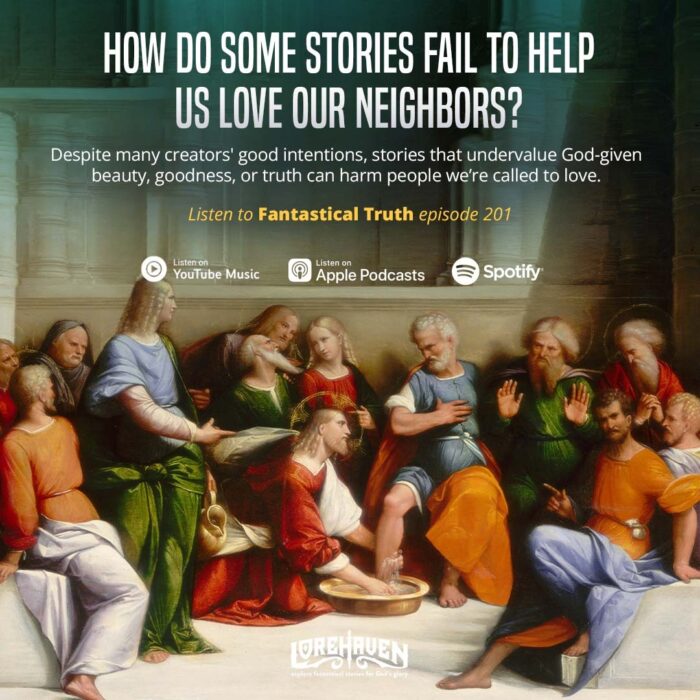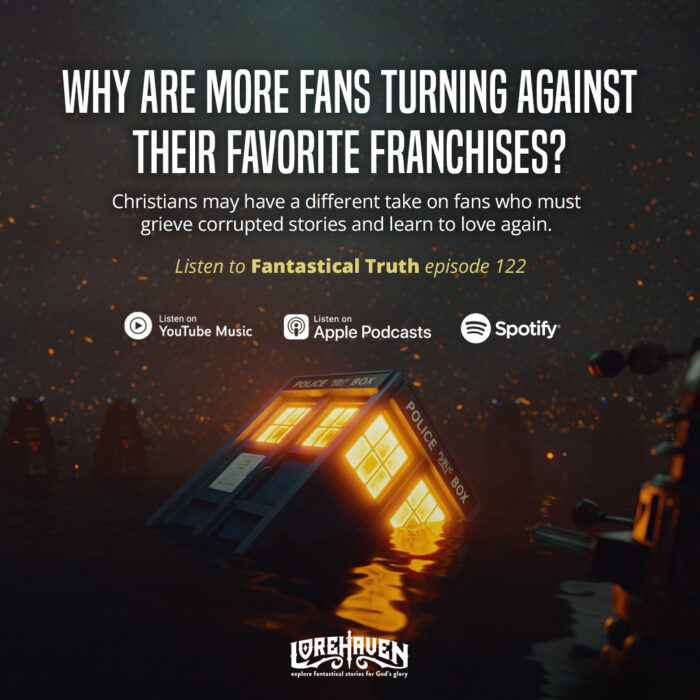251. Could a Cultural ‘Vibe Shift’ Advance Christian-Made Fiction?
Podcast: Play in new window | Download (Duration: 1:23:02 — 77.4MB) | Embed
For all the years we’ve kept up with Christian-made fiction, many authors have hoped to “cross over.” They don’t want to reach only readers who are Christians. Instead, they also want to influence unbelievers. This is a great goal, to be sure. But when may our pictures of “unbelievers” not match with reality? And just within the last few years, has the “general audience” shifted so gradually that they might enjoy more overt Christian-made fiction?
Episode sponsors
- Enclave Publishing: Above the Circle of Earth by E. Stephen Burnett
- Sunrise Publishing: Squire of Truth by Jill Williamson
- Kickstarter for A Study in Shattered Spells by Josiah DeGraaf
Mission update
- Lorehaven Onscreen: Captain America: Brave New World
- Lorehaven Onscreen, coming this Thursday: House of David
- Reviews: The Springborn last week, Above the Circle of Earth this Friday
- Subscribe free to get updates and join the Lorehaven Guild
 Concession stand
Concession stand
- This episode does mention politics, but on the way to weightier matters.
- Some ideas wrongly labeled “politics” are really about cultural changes.
- For instance, how we define human beings, marriage, families, religions.
- We loosely define the word “woke” as secular/leftist orthodoxy or tropes.
1. How do we imagine ‘the general audience’?
- By “we,” I mean Christian authors/leaders in the fantastical communities.
- Many authors have long wanted to break out of Christian “bubbles.”
- After all, some Christians don’t like/care about fantastical fiction.
- But we believe “the world” certainly does love these kinds of stories.
- So for marketing reasons, it makes sense to appeal to general readers.
- Christians may also have biblical motive: to be witnesses in the world.
- We may not want to evangelize people, but be pictures of Jesus to them.
- We’d like to step around other people’s prejudice against Christianity.
- And that’s where our attempts may fall flat, or else be subject to bias.
- Based on our own experience, and conversations, we can get myopic.
- We may assume all unbelievers share our negative views of “the church.”
- And when you mix in political tropes, well, we’re very quickly captured.
- Example: another recent mid but strange “He Gets Us” big game ad.
- This ad seemed to think “what is greatness?” plays big for unbelievers.
- Pictures showed more acts of humility (as seen by particular Christians).
- Similarly, last year’s ad took pains to challenge “those bad Christians.”
- Many Christians assume others are motivated by dislike of “the church.”
- Some well-intended Christians repeat this rather narrow understanding.
- It really does seem more based on the Christian’s own projected views.
- But actual unbelievers are a diverse lot. Some are wounded. Some hate.
- Depending on your area, unbelievers may have no church experience.
- Most, it seems, are often preoccupied by trivia or games on phones.
- Lewis’s Screwtape: Demons do best not by argument, but distraction.
- These narrow or outdated notions tend to affect Christian creative folks.
- We need to be aware of “positive world, neutral world, negative world.”
2. But what is the actual ‘general audience’?
- For most faithful Christian authors, today’s “general audience” is no longer a bunch of secular folks with bad church experiences who just need to see Christian love or creative excellence.
- That may have been true before, but it’s no longer true for this era.
- If you want stories with Sexualityism, identity politics, and/or overt sensual content, few faithful Christian authors may tempt you away.
- They won’t be assuaged by our pleas that we’re better/holier/politer.
- In fact, many “woke”-friendly folks quite enjoy their side of “culture war”!
- Maybe you’re called to that space. If so, then God help you go therefore!
- We are here, however, talking about general trends and not exceptions.
- Please note that we’ve had guests on this very podcast who have told us they got their creative experience in secular settings, but eventually needed to leave because of the clear hostility against their faith.
- These folks are loving, excellent, and have their own frustrations with some churches, but they’re still unable to “reach the lost” as creators.
- Today’s “general audience” for Christian-made stories look very different:
- They are not closed, but open to public expressions of Christianity.
- They tend to be culturally conservative, or at least “anti-woke.”
- That means they dislike movies, games, shows that seem “woke.”
- This includes “DEI” (particular views of social policy) and other ideas.
- They don’t watch much TV, but they really like listening to podcasts.
- Often they perceive more foes among secularists than Christians.
- Most of them voted with the majority in the recent U.S. elections.
- They’re feeling more optimistic about the cultural shift in the U.S.
- They’re the reason for what many call a “vibe shift,” also globally.
- See this article, “Vibe Shift,” from Santiago Pliego at Substack.
- Also reference this article by Niall Ferguson in The Free Press.
- Most important for us, these folks tend to be fans of fantastical stories.
- Many of them are men, often young men, interested in philosophy.
- They can be Very Online, engaging in free speech, maybe trolling.
- They are readers, board gamers, video gamers, content creators.
- Best of all, they don’t really have stigmas about “Christian fiction.”
- Years ago, Stephen identified this group as a key Lorehaven audience:
- Christian fans, individuals who enjoy reading/making these stories
- Homeschool families, clans who train their kids to love reading books
- Church influencers, evangelical leaders open to good fantastical fiction
- Cultural conservatives, non-Christians who are open to biblical virtues
- This “vibe shift” marks the rise of that last group, cultural conservatives.
 3. What are the ‘vibe shift’ pros and cons?
3. What are the ‘vibe shift’ pros and cons?
Advantages abound for Christian creators of fantasy
- As mentioned, these readers don’t have stigmas about these stories.
- They don’t dislike churches; in fact, many are drawn back to church!
- Many have come to believe absolute evil and God’s law before anything.
- That leads some to find not just His law but His saving gospel in Christ.
- Others (like Jordan Peterson) might not clearly believe in Jesus, but they recognize that Christianity has great benefits to culture and institutions.
- So they delight in stories that are “wholesome” and traditionally moral.
- They like books, or else want to like books, which is often close enough.
- And they listen to long-form podcasts, eager to cultivate their minds.
- Stephen has seen folks eager to hear about Above the Circle of Earth
- Some are not Christian, or else pre-Christian, or sometimes hard to tell …
- How much more may non-overt Christian-made stories appeal to them!
 But we may face new threats while engaging this culture
But we may face new threats while engaging this culture
- Some of these folks want to take “parts” from Christianity, such as the Bible’s teaching about virtue and institutions, but reject Jesus Himself.
- Or because of an anti-institution posture, some reject good institutions.
- These folks live in bad “neighborhoods” near bigots and misogynists.
- We see worse notions, like overt racism, anti-Jewish hatred, and hatred.
- Thus, if we want to connect with these folks, we may risk internalizing what they believe is good, and letting this influence our imaginations.
- This would be a mirror-universe version of old “seeker-friendly” shtick.
- A milder yet bad risk: some folks in this space like to live for the fight.
- Like old veterans of “culture wars,” they simply refuse to stop fighting.
- At a recent Daily Wire “Backstage” event at a conservative conference, pundits Ben Shapiro, Jeremy Boreing (who’s making a Pendragon Cycle streaming series), Matt Walsh, Michael Knowles, and Andrew Klavan agreed: there’s no use defending virtue unless you use them to build.
- So these folks who reject bad institutions must learn what they’re for.
- That’s where stories, appeals to imagination, can do more than sermons.
- Yet no matter who’s “the majority” in culture, no matter where the “vibe” is shifting, our chief end is to glorify God, not please sinful humans.
Com station
Top question for listeners
- Have you witnessed the “vibe shift” away from secular notions and toward Christianity(-ish) ideas?
Next on Fantastical Truth
The fight for the Space Mission begins in his homeworld. Brock Rivers never wanted to be a repairman on Mars. Years ago, he failed to protect his family, and now he labors across a frontier planet to keep his children alive and escape CAUSE. Now he is summoned back to Earth for an impossible dream: to resist CAUSE, confront the secret adversaries among his own people, and to restore gospel missions in the 22nd century, Above the Circle of Earth.

































Is there a way that someone could write a story about a non-white protagonist that the anti-woke people would accept? Because I couldn’t help but notice that the Little Mermaid movie never brought up the fact that the lead actress was black in the script itself (I suspect that the same will be true of the Snow White movie) yet people still assumed she was cast because of DEI. (I’m not arguing those movies don’t exhibit generally leftwing worldviews BTW.)
Eric D July (YoungRippa59 on Youtube) has done just that with his Rippaverse comics. His first comic, Isom, has a black main character and it was wildly successful with his nonwoke audience. Woke people were the ones that hated it. Eric spent many years talking about comics and his opinions of them, so he built an audience that knew where he was coming from and knew he was just trying to tell a good story, rather than put DEI in his comics.
Gothix, another Youtuber, was cancelled by the woke crowd for disagreeing with woke commentary on the live action Little Mermaid movie. She is now a nonwoke Youtuber, but she still did an interview with a guy that writes nonwoke comics that feature many “people of color”. Nonwoke people are often willing to read stories with non-white protagonists, they just have to know that the story isn’t coming from a woke place, or else find the story enjoyable in spite of the story’s woke world view. I vehemently disagree with wokeness, but I’m still fine with reading stories that have non-white protagonists.
I don’t know for sure on The Little Mermaid. I will say that just because the script doesn’t mention the actress’ race doesn’t mean there was no DEI involved in casting. The people in charge of casting may have made their own decision separate from what the script writers wrote, and they may have avoided making the DEI based decisions public because they knew it was controversial. Even if the casting choice wasn’t due to DEI, though, people still disliked it on the grounds that it completely ignored the character design of a beloved cartoon protagonist. A lot of people care about consistency and accuracy with stuff like that, and people get frustrated when their desire to stay consistent with character designs and worldbuilding lore is automatically chalked up to racism, which is what happened in some instances.
Thanks for the reply.
I guess I’m cynical about what you say about the need for staying true to “the character design of a beloved cartoon protagonist” because much of the criticism leveled against Disney’s recent line of photorealistic remakes, including The Little Mermaid, is that they just recreate what was already done in the old, hand-drawn movies. Seems like kind of a heads-I-win-tails-you-lose thing. (Of course, the criticisms could be coming from different people.)
I roll my eyes when liberals complain about white people “appropriating other’s cultures.” Like Caucasians shouldn’t be allowed to wear sombreros because they “belong to” Hispanics. To me, rightwing people saying that the 1989 Little Mermaid “belongs to” them is along the same lines.
Also, like I said, I saw The Little Mermaid remake and I thought the main actress was one of the best things about. And while I’m not in any hurry to see the Snow White remake, I did see the actress in West Side Story, and she was awesome in that. (That doesn’t mean she has a good worldview or is a great human being or anything. But isn’t boycotting her work because of her personal issues the same as cancel culture?) So if the problem with DEI is really that it’s rewarding members of minorities who are untalented or incompetent, I really feel like DEI critics jumped the gun.
I don’t really think it’s a matter of conservatives saying that The Little Mermaid belongs to them. It’s not really a complaint about cultural appropriation either. As someone that does a lot of intricate worldbuilding and character design stuff, design consistency does matter. And it gets pretty annoying when people just randomly and arbitrarily change those things up, only to act like everyone has to like it even when the changes make the story worse, not better. And with the live action versions in general, there were a lot of changes that made the movies worse (not just with casting choices). So for a lot of people these movies just feel like nostalgia bait. If they did an amazing job with these movies, there would be nowhere near as many complaints.
Just because people complain that Disney is rehashing old material doesn’t mean every change is automatically a good thing. If they wanted to do something new with the Little Mermaid, I think they should have decided not to base it on the original Disney animation, and instead look at the original fairy tale and mermaid lore in general, then make a completely new adaptation. People would have probably been more forgiving of that.
I actually meant the objectors were saying that the character belongs to white people, not conservatives. I’m sorry for being confusing. It’s just that the term “white” has become an insult so I feel like I can’t use it too much now without sounding like I’m insulting people. It’s so annoying!
FWIW, having seen both Disney’s Little Mermaid movies, they’re both pretty fluffy and not really full of intricate world building. While I’d much prefer your suggestions to what Disney did in the 2023 movie, it did have a hilarious in-joke for viewers familiar with the original story (“Has Ariel killed the prince yet?”) and it began with a quote from it that struck me as really random at first but paid off dramatically in the last scene. I wouldn’t have expected something that clever and subtle from a commercial Disney remake.
Here’s part of the reason why I can’t get as upset about these things as other people. I grew up (in the 2000s) being more enthusiastic about literary fairy tales than movies and stuff. And I also grew up with those fairy tales being reimagined to take place in other cultures or with characters’ genders flipped, often with some kind of implicit or not-so-implicit criticism of the original included. So when people got all up in arms about the Ghostbusters remake, I was like, “Join the club, bub.” 🙂
I consider myself conservative but, as an artist, I’d kind of hate it if people just read my work because of that. It seems like the anti-woke people unthinkingly support things because they’re not liberal. I want people to read my work because it’s objectively good.
I feel the same way, in that I want people to read my work because it’s objectively good and they enjoy it, not solely because they want to support a cause. That said, even if someone says they are reading your work because they want to support conservative art, they probably do still actually like your work to a reasonable extent. Like, I doubt they’re thinking ‘Ugh, this guy’s stories are terrible, but I’ll put up with them because he’s conservative’.
I’m mixed race (mainly white and latino) along with being a woman, so I’ve definitely had to consider the frustrating fact that some people out there might read my work or pick me for things because of what group they consider me part of, rather than seeing me as an individual. Obviously I don’t want people to pick me because they’re trying to make sex or race DEI quotas, and I don’t want DEI advocates to use me to push ideology I want no part of. One solution to that type of problem is to just focus on being the best artists/people we can be. If a person honors God, makes sure to always be his best self and consistently hones his craft, most other things tend to fall into place on their own.
In my case, a lot of people won’t read my work for DEI purposes because I don’t participate in DEI stuff (I don’t submit my work to Latino Heritage month type stuff, for example). And I focus on telling the kinds of stories that I love and believe in, and staying consistent in that focus means I will probably fall outside of what woke activists demand. As a result, the DEI people will probably be too busy disliking me to use my stories as their diversity homework. If they are willing to still read my work in spite of the fact that I disagree with them, I’m alright with that, because that is an opportunity to change their minds, and by that point they are probably reading my work because they actually like it and want to hear what I have to say, not because they’re reading my work to support a ‘woman of color’.
Bringing that principle into your own work, just write the best stories you can — stories you can be proud of — and talk about why you write the way you do. The people who enjoy your stories and are fine with your storytelling philosophy will stick around, and the ones that don’t like it will leave. Or, at the very least, you’ll know they probably aren’t reading your work just for the sake of supporting conservative causes.
That said, you’re never going to get 100% percent of anything. Maybe there will be a few people that read your stories just because it’s conservative, but does that really matter so long as there are lots of people (perhaps the majority of your audience) that reads your work because it’s objectively good?
It’s actually probably a huge stretch that a large group of people would read the book I’ve written at all. LOL. It’s pretty weird.
For the record, it’s not a story that’s really about politics per se. If it is to an extent, I’d assume/hope they’re conservative since that’d reflect my general beliefs. But probably not enough to specifically market to an audience. Plus, it feels like there are a lot of conservatives who would say, “you’re not a real conservative if you whatever” and, for that matter, a lot of liberals who would say, “you’re not a real liberal if you whichever.” So it’s hard to know how people will peg me.
Anyway, thanks for the advice.
The book I mentioned that I’ve written is probably too pro-Christian and too conservative for secular readers but it’s not really Christian (or conservative) for me to feel like marketing it to that audience would be honest. That’s what I meant about it being weird.
I meant “not really Christian (or conservative) enough for me to feel etc.” Not that it’s not that way.
Excellent episode. I really appreciate the way Zachary and Stephan covered this topic, the depth, and as always, keeping everything so well informed from a biblical perspective.